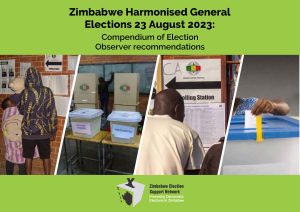INTRODUCTION
The desirability of holding harmonised presidential, parliamentary and local government election in Zimbabwe
remains a subject of debate for academics and practitioners despite the adoption of the system on 30 October
2007. A harmonised election in the Zimbabwean context can best be conceptualised as an election in which voters
cast ballots for different political offices, namely the president, Members of Parliament (MPs), and local
councillors, at the same time. In other countries and in electoral studies these are commonly referred to as
simultaneous or synchronised elections. The most prominent argument in favour of holding local municipal
elections separately dates back to the progressive era from the 1890s to the 1920s. It is that holding elections
separately allows voters to give adequate attention to local issues without distraction from national races. In
addition, proponents argue that harmonised elections can distort results as people are likely to vote along party
slates, overwhelm voters and provide administrative and logistical challenges for electoral bodies. However, a
considered view is that synchronising local government with presidential and parliamentary elections will result
in: high voter participation and diminish voter fatigue; increased competitiveness and profile of local elections
contrary to conventional wisdom; huge financial savings to the public exchequer and one financial plan for all
spheres of government; regular holding of local government elections; minimisation of calculated closure of the
democratic space as local-only elections can be seen as a portent for the subsequent general elections; fewer
cycles of uncertainty for corporate investments; less cycles of violence and human rights violations which
correspond with elections; increased time for government and society to spend on development work, production
and governance and democratic progression in Zimbabwe’s post-colonial electoral transition.
